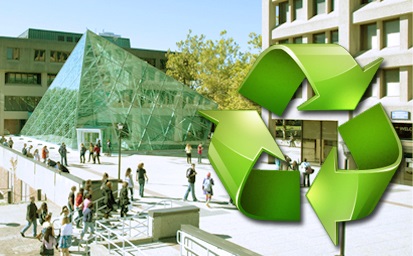New Paltz selected for The Princeton Review’s Guide to Green Colleges
 The Princeton Review has selected the State University of New York at New Paltz for inclusion in its 2014 “Guide to 332 Green Colleges.” The guide, produced in partnership with the U.S. Green Building Council, profiles higher education institutions that demonstrate a strong commitment to environmental sustainability in their academic offerings, campus infrastructure, activities, and career preparation.
The Princeton Review has selected the State University of New York at New Paltz for inclusion in its 2014 “Guide to 332 Green Colleges.” The guide, produced in partnership with the U.S. Green Building Council, profiles higher education institutions that demonstrate a strong commitment to environmental sustainability in their academic offerings, campus infrastructure, activities, and career preparation.
In this year’s guide, the college was recognized for its academic programs, environmentally friendly buildings, campus-wide submetering project, its adoption of the Real Food Challenge’s definition of real food, and developing a zero waste program. The guide also mentions the work of several student-led groups whose focus on sustainability issues is making a difference, including Students for Sustainable Agriculture, the Recycling Club, the Hydration Committee, and NYPIRG.
New Paltz was among ten SUNY schools selected for the 2014 guide.
“SUNY campuses across the state are among the most energy-smart in the nation, a leadership role that we continue to build upon through the expanded use of green technologies and sustainability initiatives,” said SUNY Chancellor Nancy L. Zimpher. “Congratulations to SUNY New Paltz and all 10 SUNY campuses to be included in the 2014 Guide to Green Colleges. This recognition is much deserved and highly commendable.”
New Paltz has been included in four previous editions of the guide. The schools profiled in this year’s guide feature information for prospective students—facts and stats on school demographics, admission and financial aid—plus write-ups on the schools’ sustainability initiatives. A “Green Facts” sidebar reports on a range of topics from the school’s use of renewable energy sources, recycling and conservation programs to the availability of environmental studies and career guidance for green jobs.
New Paltz is committed to environmental sustainability and responsibility. The college offers strong academic programs in environmental geochemical science and environmental studies, which are supported by local and regional environmental organizations that offer students internship and research opportunities. These organizations include: the Mohonk Preserve; the NY State Department of Environmental Conservation; the Estuaries and River Institute; the Hudson Basin River Watch; the Institute of Ecosystem Studies; Clearwater; Scenic Hudson and the Ulster County Environmental Management Council.
